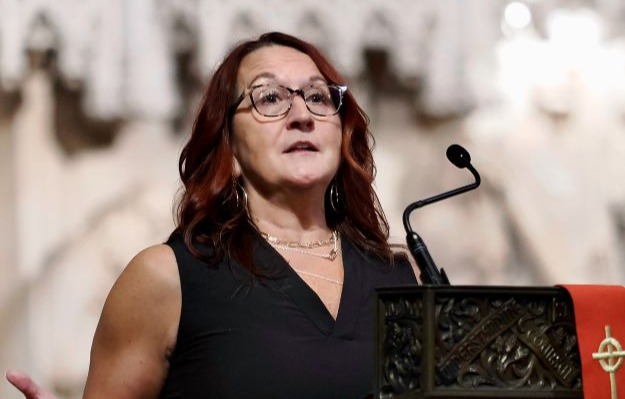Commentary on Romans 8:14-17
Today is Pentecost Sunday. In our liturgical calendar, we commemorate the outpouring of the Spirit of God at the start of the Christian church. The event is canonized in Acts as an onrush of mighty wind appearing like divided tongues of fire settling on the disciples, giving them the ability to speak (Acts 2:1–4). Contrary to popular imagination, the disciples were not speaking in tongues; they were empowered to speak boldly as wise men dispensing inspired words of wisdom.
The real demonstration of the Spirit’s power appears only in the next part of the story, when visitors from other lands found they could understand the disciples’ Galilean speeches as well as they could understand their own mother tongues (Acts 2.5–12). In other words, the Spirit was poured out on all who were there, even hearers who came from “all the nations under heaven” (Acts 2:9–11). This led Peter to declare, then and there, that Joel’s prophecy was being fulfilled, that God’s Spirit would be poured out upon all flesh (Acts 2:17; see also Joel 2:28). The world was being renewed and recreated by the Spirit of God.
Only in the context of the new creation can we understand Paul’s harsh words on flesh and spirit. “New creation” does not appear in Romans 8, but it features prominently in Paul’s writings (2 Corinthians 5:17; Galatians 6:15) and drives the narrative of this chapter. Paul begins with Christ’s resurrection, because that event first convinced him that cosmic changes were afoot. But what has that to do with us? “The Spirit of the one who raised Jesus from the dead”—that is, the same Spirit that set off the new creation—“dwells in [us also]” (8:11).
This is such momentous news that Paul announces it four times in the three verses leading to our passage (8:9–11). Being in the Spirit leads to life because that is the mark of the new creation; being in the flesh marks one as part of the passing creation, which is characterized by decay and death (8:20–21).
Death is therefore not a punishment for anything we have done; it is the result of denying the regenerating Spirit and returning to the chaos governed by a former, rapidly weakening principle: flesh (8:12–13). We are “debtors” (8:12) not because we have contractual obligations to some wrathful deity; we are debtors because we are bound by the inexorable logic of the new creation. The world is being renewed, surging toward life while voiding decay and death. No one can blunt the inexorable but re-creative force of Spirit; following the Spirit that dwells within is the only rational step one should or could take.
If we do, we become children of God and take part in the new creation with the Spirit. Paul’s language in 8:14 leaves the relationship between being children of God and being led by the Spirit ambiguous: “As many as led by the Spirit of God, these are the children of God.” Being God’s children is not conditioned on being led by the Spirit, as if only then could one be qualified to be children of God. But neither does it mean that being God’s children automatically imbues us with a natural inclination to follow the Spirit. Rather, being led by the Spirit is simply what the children of God do, as rationally and as naturally as they breathe the air around them. Indeed, the creative Spirit is the very air that envelops and nurtures the new creation.
With perfect justification, then, Paul reminds us that we have received a “spirit of adoption” through whom we can cry out “Abba, Father” (8:15). Here Paul changes his perspective slightly from the first time he made a similar observation. In Galatians 4:6, the spirit cries “Abba” while we remain passive; here, through the spirit of adoption we have agency in making this declaration—a declaration not only of belongingness but also of allegiance. The difference is slight, but the implications are enormous. We now have full cognizance of our identity as children of God, and we embrace it with gusto—so much so that our spirit is so autonomous and so self-sufficient, it can now work hand in glove with the Spirit of God to bear witness to who we are (8:16).
“To bear witness with” (symmartyrein), used here, is the first of four compound words with the Greek prefix syn-, all calling attention to our role in the new creation and our mutual relationship with the Spirit of God. Paul declares that “if we are children, we are heirs, and if we are heirs of God, then we are joint heirs [synklēronomoi] with Christ” (8:17). Inasmuch as Christ stands to inherit from God as a legitimate heir, we stand in the same position to be joint heirs with Christ. Inasmuch as Christ the Wisdom of God took an active part in the original creation, we as joint heirs must also actively participate in the new creation. And inasmuch as Christ was a co-creator with God, we too must accept, with humility but also with much boldness, our role as co-creators jointly with Christ.
Whether we succeed in discharging the responsibilities that befit our role hinges on a choice—a choice between flesh and Spirit, the same false choice we were asked to make at the outset. The way of the flesh is to deny the new creation and our role in it and to let nothingness rule over our passivity. The way of the Spirit leads to joint glorification (syndoxazein) with Christ, but it also leads to the cross. As Christ’s resurrection and glorification passed through the suffering on the cross, so too will our resurrection and glorification. We have no choice but to side with the Spirit, and we have no choice but to take up the mantle of co-creatorship with the Spirit of God—provided we jointly suffer (sympaschein) with Christ. And that gestures toward the cross.




June 8, 2025